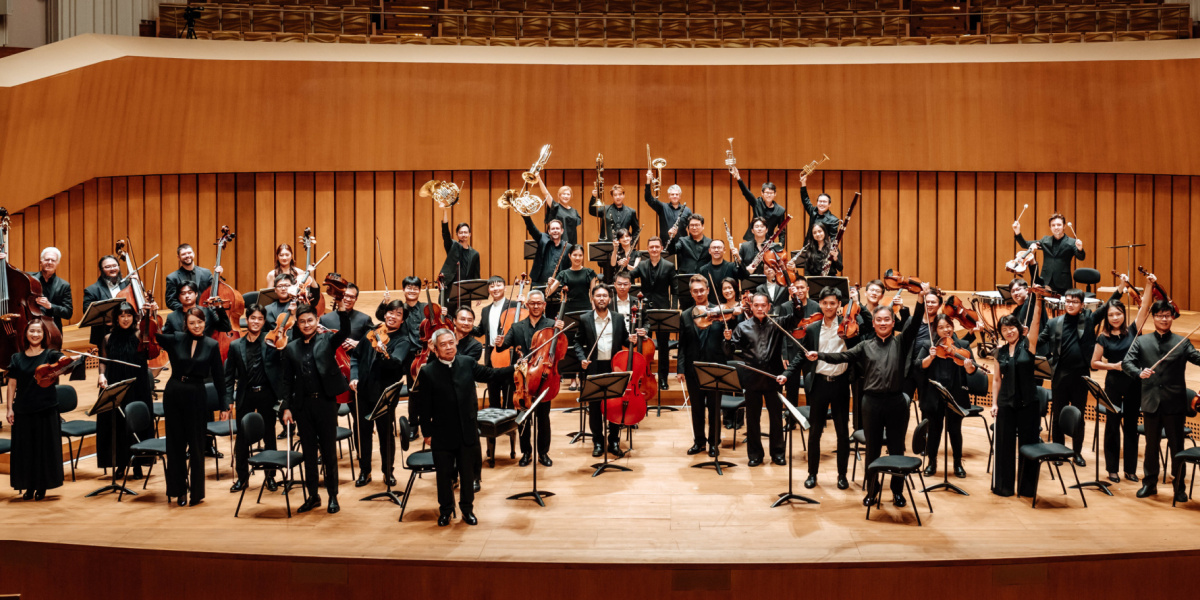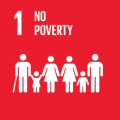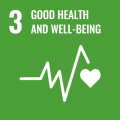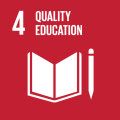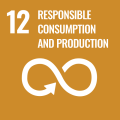2025 TC Music Festival: From the New World
In 2024, Taiwan Connection (TC) marked its 20th anniversary with the theme The Great Revisited, paying tribute to Franz Schubert’s short yet breathtaking life. In 2025, TC Music Director Nai-Yuan Hu presents a completely different theme, From the New World.
“Antonín Dvořák’s Symphony No. 9 in E minor, From the New World – from the title alone, is this piece depicting the new world, or is it about the composer’s longing for his homeland?” says Hu.
The Secrets Hidden in the Score
Czech composer Dvořák was invited to New York to serve as director of a music conservatory. He carried a special mission – to help America discover its own musical identity. In the US, he encountered African American spirituals and Native American musical traditions for the first time. Rooted in the painful and tragic lives of enslaved people, African American spirituals also conveyed a deep yearning for faith and hope. They gave voice to the soul.
Dvořák’s From the New World incorporated the styles of these folk traditions. Within this symphony, one can even hear pentatonic melodies reminiscent of eastern musical colors. These five-note elements are found across many cultures’ folk music worldwide, sometimes making it hard to trace their origins, yet they feel strangely familiar and deeply connective.
Perhaps Dvořák’s new world was not merely a geographic depiction, but an exploration of the human spirit. When we listen to these compositions, each of us naturally reflects on our own life journey. This echoes the theme of this year’s TC Music Festival, From the New World. Through the music, we hear the version of ourselves still seeking direction.
Romantic Music: The Interplay of Emotion and Reason
This year’s program includes Johannes Brahms’s Concerto for Violin and Cello in A minor, a piece with a unique story behind it. Violinist Joseph Joachim was a close friend whom Brahms met when he was just 20. The two were deeply connected musically, yet their friendship had been severed for several years. Brahms composed this double concerto as a gesture to mend that relationship – a gift of reconciliation. “A concerto featuring both violin and cello is quite rare. In a way, Brahms was using music to convey something to his friend... If you listen closely, you can hear the dialogue between the instruments. And at one point in the second movement, it almost feels like a gentle quarrel, a back-and-forth exchange between old friends,” explains Hu.
Hu continues, “Brahms was an extremely introverted and sensitive person. He had to work through his emotions within the framework of structured movements. In other words, he needed to find a balance between reason and emotion in order to create art.”
Meeting Through Music, Learning Through the World
For this year’s music festival, Hu selected Lento assai from Ludwig van Beethoven’s String Quartet in F Major as the opening piece – an unusual choice, as most concerts do not begin with a slow movement. “It is in memory of pianist Fou Ts’ong on the 5th anniversary of his passing,” said Hu, who had known Fou for decades and described their relationship as both mentor and friend. “In this era, few people dedicate themselves to music with such passion and devotion. He truly lived within music.”
Following the opening, Hu will perform Brahms’s Double Concerto for Violin and Cello alongside world-renowned cellist Gary Hoffman, often praised as “a poet of the cello blending technique and soul.” Known for his profound musicality, warm tone, and refined interpretations, Hoffman and Hu are long-time friends. “Gary and I knew each other back in school. He was already teaching, and I was still a student. It’s been over 30 years since we last met. We both love the early 20th-century style of string playing, when every musician had a distinct voice.”
In recent years, TC has continued to invite guest artists from around the world to perform with Taiwanese musicians. This exchange is not just a symbol of internationalism, but a source of true inspiration and nourishment. Among this year’s international guests are oboist Juan Perchuan Ramirez from the Deutsche Oper Berlin and English hornist Iria Folgado from the Konzerthausorchester Berlin both introduced by Taiwanese French horn player Yu-Hui Chuang, who resides in Berlin.
Hu says, “Some of these musicians don’t even know each other. It’s all through introductions by friends. In my life, I’ve mostly been a soloist or chamber musician, so I rarely engage with the kind of symphonic works performed by the TC Chamber Orchestra. That’s why this has become a valuable learning experience for me, allowing me to expand my understanding of classical music.
“Inviting international musicians is primarily meant to inspire local Taiwanese players. I hope our musicians can be more proactive, more eager in their pursuit of music. They have tremendous potential – but is it fully realized yet? The TC Chamber Orchestra is a platform where musicians can discover and learn from one another. I believe musicians thrive through mutual growth.”
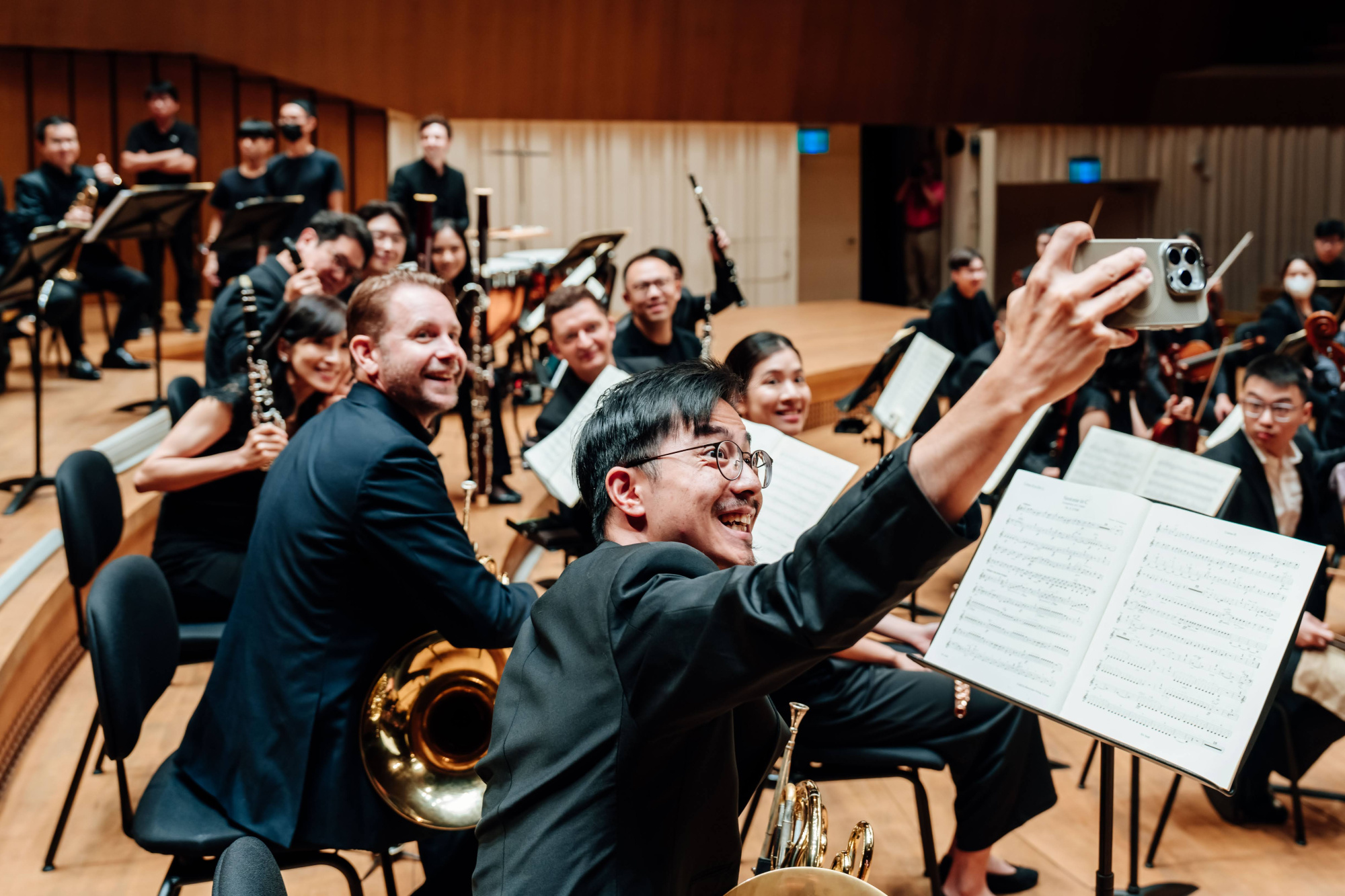
For many international artists, joining the TC Chamber Orchestra is also a journey of rediscovery. Former associate principal cellist of the New York Philharmonic, Patrick Jee, shared that after his first visit, he realized TC felt completely different from his regular professional routine. “Many players actually brought full scores to rehearsals!” he noted. On his second visit, he felt the experience helped him reconnect with the joy of making music.
Hu pointed to the Berlin Philharmonic as an example, “Each member plays like a soloist. Sometimes when the conductor gives a direction, they’ll even ask, ‘Are you sure you want that tempo?’ – something you’d rarely hear in American orchestras. Their first rehearsal of a new program might be a little chaotic, but within a few days, they develop an astonishing synergy.”
From Rehearsal to the Stage
At a TC Chamber Orchestra rehearsal, mutual listening is essential. “Rehearsals are really about resolving technical coordination issues, not necessarily just about musical interpretation,” explains Hu. When he leads, body language can be crucial. The musicians can sense how fast or slow the tempo is, or how it should gradually accelerate or decelerate. Beyond tempo, these gestures also convey musical emotion and mood. The entire orchestra relies on this shared physical language to move together in the same musical direction.
Violinist Hsuan-Hao Hsu, who joined the TC Music Festival three years ago, shares, “When playing alongside Mr. Hu, I realize he wants us to respond to him. It’s like tossing something to him, and he tosses it back with a sly smile. The whole exchange is really fun.”
Cellist Shih-Lin Chen described his experience in an interview, “With classical pieces, even if you haven’t played them in a while, you relearn them each time. Brahms’ music is like that too – each age brings a new feeling to it.” He describes these works as possessing inclusiveness. No matter what stage of life you return to them from, they always reflect who you are in that moment.
When speaking about performing on stage, Hu recalled a lesson with his teacher, “He took out Hamlet to illuminate the passage where Hamlet discussed how overacting can be off-putting, while underacting fails to draw the audience in.” This delicate balance is what performers must master. They must not rely solely on technique to control the music but also mustn’t let their emotions spill out without restraint.
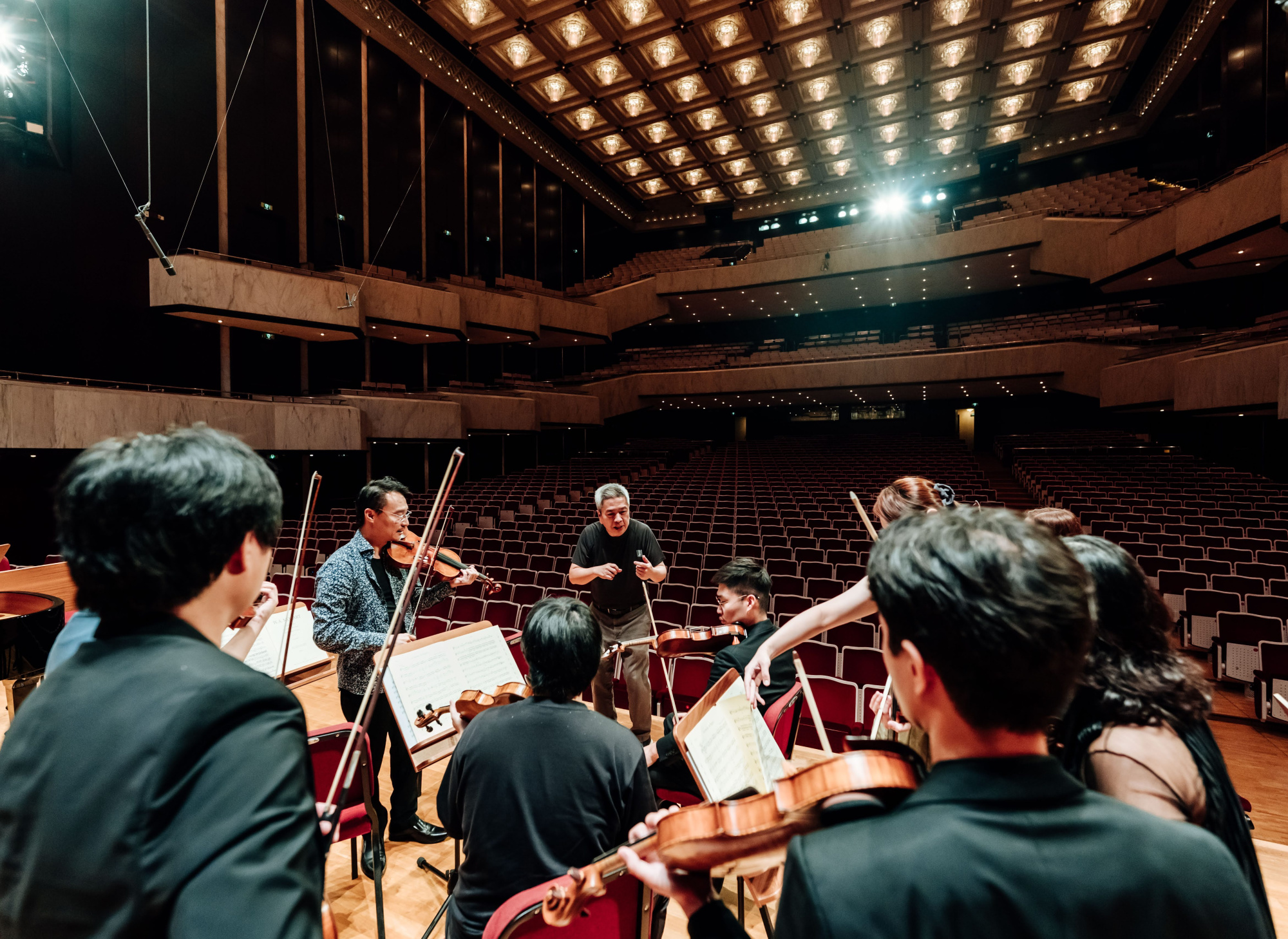
Bringing Music Beyond the Concert Hall, Bringing Reflection Back into Life
Reflecting on the repertoire choices from TC Chamber Orchestra over the past 20 years, Hu shares that they have performed many masterpieces from the late 18th to the late 19th century. These works endure because they still resonate with contemporary society. “There’s a word in English – reflect,” Hu says. “When you listen to music, you reflect on what you've just experienced and felt. True art isn’t merely entertainment, it makes you think – what truly matters in my life?” Hu’s greatest hope is that when audiences attend the TC Music Festival concerts, they can separate themselves from all the noise of the mundane world outside, and fully immerse themselves in the music for those two hours.
TC has always strived to bring classical music into everyday life. In addition to the concerts, Hu continues last year’s initiative – a series of music-centered talks hosted by Chia-Heng Wu, long active in publishing, translation, and the classical music world, held at independent bookstores. This creates a space for readers who might not usually step into a concert hall to encounter classical music in person and hear Hu speak freely about the art form.
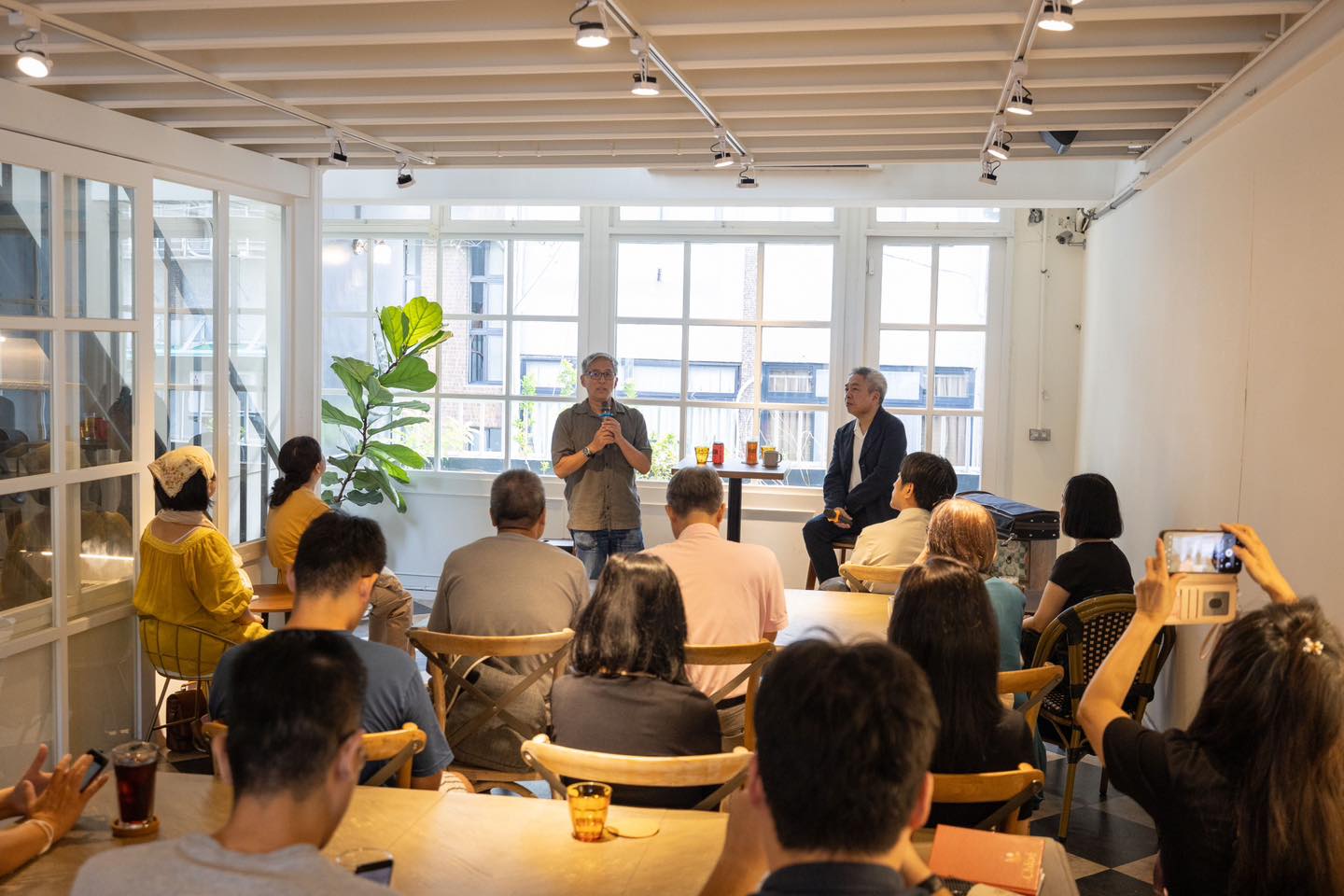
“These talks aren't meant to be classes,” Hu explains. “They’re meant to help people feel that behind the music, there are people, emotions, and stories. If the content moves someone, they’ll want to draw closer and begin to believe they can understand music.”
To Hu, classical music, like classic literature, is ultimately about human nature. “Shakespeare’s plays, the paintings in museums, those works that truly move us are never just about history. They’re about humanity. And so is music.”
“I still hope that, in the end, people will be willing to come into the concert hall and sit down for a live performance,” he says. “The more you listen, the more you begin to sense the differences; and the more clearly you’ll know what you truly enjoy.”
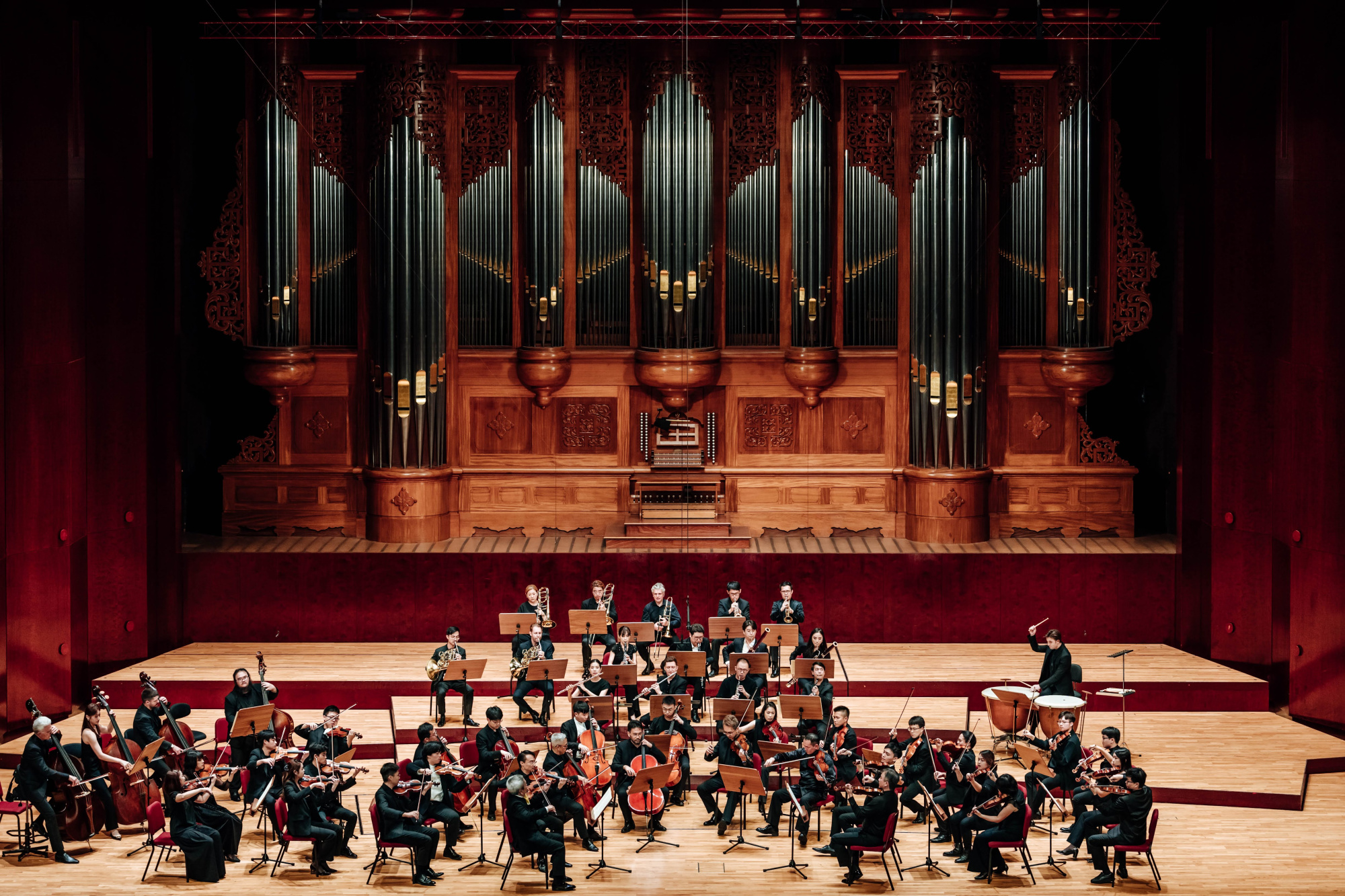
From the Unfinished Movement, Continuing Toward a New World
When speaking about the future of TC, Hu admits, “From its founding in 2004 until now, I never imagined we’d come this far.” At the time, the vision was simple – to “connect Taiwanese musicians from home and abroad, and to bring rehearsals and performances filled with classics and heartfelt moments to our homeland.” “Among all the art forms, music is the most abstract... A painting can be hung on a wall, a book can be reread; but once a musical performance ends, it vanishes into the air. What remains is only the feeling of that precious moment.”
Precisely because of this, every performance is unrepeatable and must not remain static. “We don’t settle just because something went well. At the end of each concert, we still ask ourselves – can we do even better next time?”
The journey of TC to this point is not a completed movement, but an ongoing journey. It is another layer of meaning behind From the New World born of curiosity toward the unknown, a reflection on the self, and an unending pursuit of music.
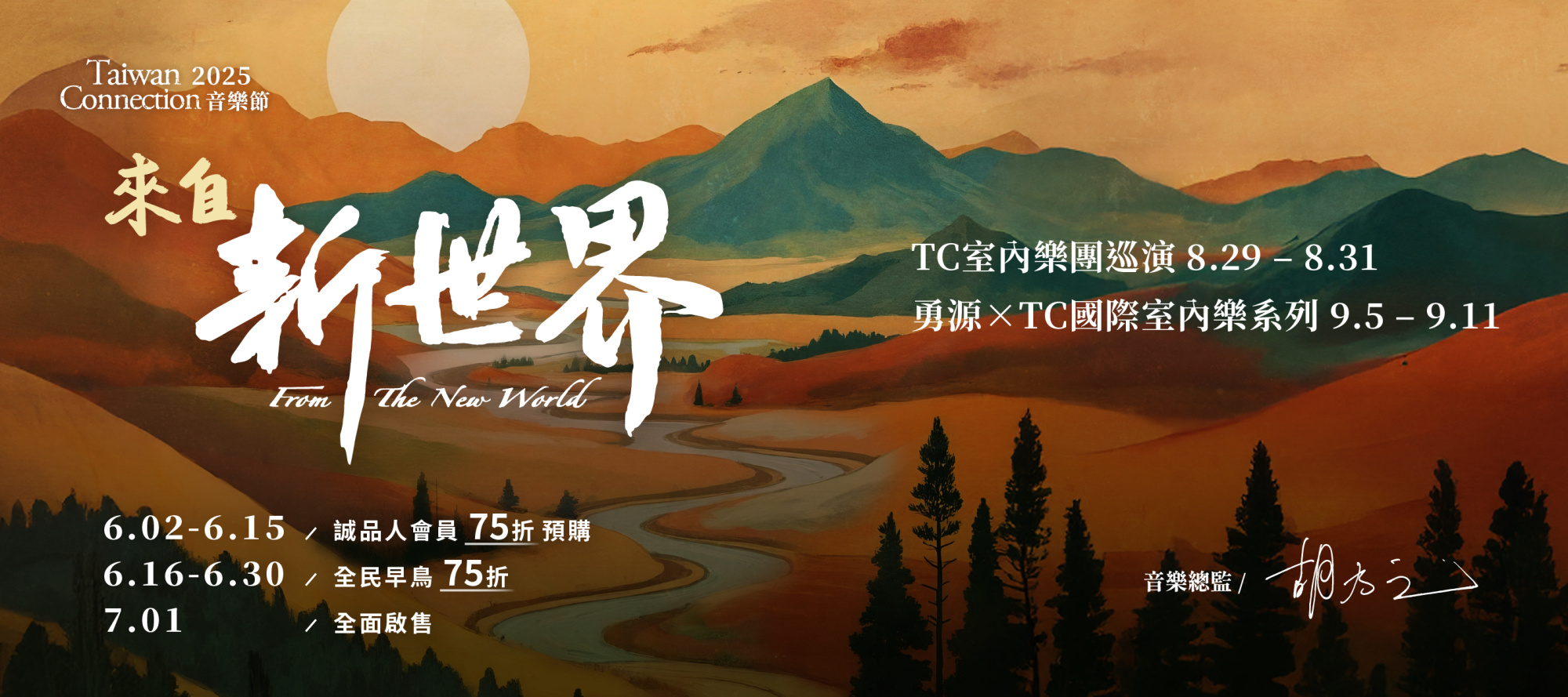
2025 TC Music Festival
▍TC Chamber Orchestra Tour – From the New World
- August 29 (Fri), 7:30 PM – National Kaohsiung Center for the Arts (Weiwuying), Concert Hall
- August 30 (Sat), 7:30 PM – Chiayi City Cultural Affairs Bureau, Concert Hall
- August 31 (Sun), 7:30 PM – National Concert Hall, Taipei
- Beethoven: Lento assai from String Quartet in F Major, Op. 135
- Brahms: Concerto for Violin, Cello and Orchestra in A Minor, Op. 102
- Dvořák: Symphony No. 9 in E Minor, Op. 95, From the New World
▍Chen-Yung Foundation × TC International Chamber Music Series I: Autumnal Brahms
- September 6 (Sat), 2:30 PM – National Taichung Theater, Playhouse
- September 7 (Sun), 2:30 PM – National Kaohsiung Center for the Arts (Weiwuying), Concert Hall
- September 10 (Wed), 7:30 PM – National Theater and Concert Hall, Recital Hall
- Brahms: Clarinet Quintet in B Minor, Op. 115
- Brahms: String Quintet in G Major, Op. 111
▍Chen-Yung Foundation × TC International Chamber Music Series II: Mozart & Françaix
- September 5 (Fri), 7:30 PM – National Taichung Theater, Playhouse
- September 11 (Thu), 7:30 PM – National Theater and Concert Hall, Recital Hall
- Frank Bridge: Lament for Two Violas (1912)
- York Bowen: 2 Duets in G Major for Two Violas (1920)
- Jean Françaix: Clarinet Quintet (1977)
- Mozart: String Quintet in C Major, K. 515
▍Relaxed Performance—French Impression
- September 9 (Tue), 7:30 PM – National Theater and Concert Hall, Recital Hall
- Ravel: Sonata No. 2 for Violin and Piano
- Roger Boutry: Divertissement for Oboe, Clarinet, and Bassoon
- Debussy: String Quartet in G Minor, Op. 10
▍Hu’s Talks on the Bookstore Trail
- August 3 (Sun), 2:30 PM – Weiwuying Lecture Hall, Kaohsiung (Exclusive to Weiwuying Members)
- August 16 (Sat), 2:00 PM – No. 5 Yongsheng, Pingtung (No. 5, Yongsheng Ln., Pingtung City)
- August 17 (Sun), 2:00 PM – Courage Bookstore, Chiayi (2F, Building K, No. 616, Zhongshan Rd., West Dist., Chiayi City)
- August 22 (Fri), 7:30 PM – Spring Autumn Bookstore, Taipei (No. 7, Ln. 41, Chifeng St., Datong Dist., Taipei City)
- August 23 (Sat), 2:00 PM – Yoma Coffee, Taichung (No. 6, Ln. 146, Taichung Rd., South Dist., Taichung City)
※ Ticketing Offers
- Now - September 11: Purchase at least one ticket to any 2025 TC Music Festival concert and enjoy a 20% discount on advance purchase of TC’s latest album.
- June 16 - June 30: Public early bird 25% discount (not applicable to the lowest-priced tickets)
- July 1: General ticket sales open
For more discounts, event registration, and to learn more about the musicians and programs, please visit the 2025 TC Music Festival Website&FB.

